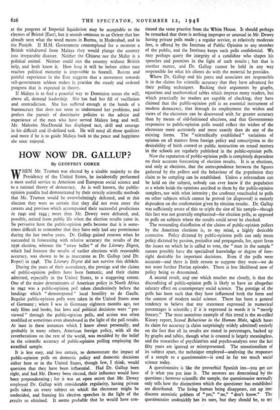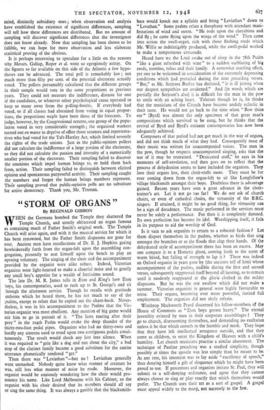HOW NOW DR. GALLUP?
By GEOFFREY GORER WHEN Mr. Truman was elected by a sizable majority to the Presidency of the United States, he incidentally performed a most useful service to American and European social science and to a rational theory of democracy. As is well known, the public- opinion pundits had demonstrated by their strictly scientific methods that Mr. Truman would be overwhelmingly defeated, and at this election they were so certain that they did not even enter the caveats and provisos which accompanied their successful predictions in 1940 and 1944 ; more than Mr. Dewey were defeated, and, possibly, retired from public life when the election results came in. So pervasive have the public-opinion polls become that it is some- times difficult to remember that they have only had any prominence during the last twelve years. Dr. Gallup gained renown when he succeeded in forecasting with relative accuracy the results of the 1936 election, whereas the " straw ballot " of the Literary Digest, which had forecast the results of earlier elections with reasonable accuracy, was shown to be as inaccurate as Dr. Gallup (and Dr. Roper) in 1948. The Literary Digest did not survive this debacle.
During the years of their ascendancy, the prestige and the claims of public-opinion pollers have been fantastic, and their claims admitted, especially in the United States, to a staggering extent. One of the major determinants of American policy in North Africa in 1942 was a public-opinion poll taken clandestinely before the landings which " demonstrated " local hostility to de Gaulle. Regular public-opinion polls were taken in the United States zone of Germany ; when I was in Germany eighteen months ago, not only films and books, but laws and political decisions were " pre- viewed" through the public-opinion polls, and action was often modified or sometimes even abandoned in the light of the poll results. At least in these instances which I know about personally, and probably in many others, American foreign policy, with all the reverberations on the rest of the world, was moulded by the belief in the scientific accuracy of public-opinion polling employing the stratified sample.
It is less easy, and less certain, to demonstrate the impact of public-opinion polls on domestic policy and domestic decisions either here or in the United States, though few, I think, would question that they have been influential. Had Dr. Gallup been
right, and had Mr. Dewey been elected, their influence would have been preponderating ; for it was an open secret that Mr. Dewey employed Dr. Gallup with considerable regularity, having private polls taken on every subject on which the electorate might be undecided, and framing his election speeches in the light of the ,results so obtained. It seems probable that he would have con-
tinned the same practice from the White House. It should perhaps be remarked that there is nothing improper or unusual in Mr. Dewey having private polls made ; a regular service, at relatively moderate fees, is offered by the Institute of Public Opinion to any member of the public, and the Institute keeps such polls confidential. We may perhaps query the integrity of a candidate who shapes his speeches and promises in the light of such results ; but that is another matter, and Dr. Gallup cannot be held in any way responsible for what his clients do with the material he provides.
Where Dr. Gallup and his peers and associates are responsible is in the claims for scientific accuracy that they have advanced for their polling techniques. Backing their arguments by graphs, equations and mathematical tables which impress many readers, but which practically ho readers are capable of checking, they have claimed that the public-opinion poll is an essential instrument of modem democracy, that through its employment the wishes and views of the electorate can be discovered with far greater accuracy than by means of old-fashioned elections, and that Governments responsive to public-opinion polls would reflect the wishes of the electorate more accurately and more exactly than do any of the existing forms. The " scientifically established " variations of opinion on all matters from foreign policy and conscription to the desirability of birth control or public instruction on sexual matters in the schools are regularly published in the public-opinion polls.
Now the reputation of public-opinion polls is completely dependent on their accurate forecasting of election results. It is at elections, and only at elections, that the correspondence between the figures gathered by the pollers and the behaviour of the population they claim to be sampling can be established. Unless a referendum can be held on the subject, nobody can ever know if the population as a whole holds the opinions ascribed to them by the public-opinion samplers, nor with what intensity ; the credence_youchsafed to polls on other subjects which cannot be proved (or disproved) is entirely dependent on the confirmation given by election results. Dr. Gallup was sufficiently aware of this to triple the size of his sample—though this fact was not generally emphasised—for election polls, as opposed to polls on subjects where the results could never be checked.
The resounding disinflation of the claims of public-opinion pollers by the American elections is, to my mind, a highly desirable corrective. Policy dictated by public-opinion polls can only mean policy dictated by passion, prejudice and propaganda, for, apart from the issues on which he is called to vote, the " man in the sample " cannot possibly have the specialised knowledge or degree of fore- sight desirable for important decisions. Even if the polls were accurate—and there is little reason to suppose they were—we do not want further Darlan episodes. There is less likelihood now of policy being so determined.
A second result, and one which touches me closely, is that the discrediting of public-opinion polls is likely to have an altogether salutary effect on contemporary social science. The prestige of the polls has been such that they have influenced both the form and the content of modem social science. There has been a general tendency to believe that any statement expressed in numerical percentages is scientific ; if it is expressed in words it is "merely literary." The most notorious example of this trend is the so-called Kinsey report, Sexual Behaviour in the Human Male, v4iich bases its claim for accuracy (a claim surprisingly widely admitted) entirely on the fact that all its results are stated in percentages, backed up by graphs and tables, though what is counted is largely meaningless, and the researches of psychiatrists and psycho-analysts over the last fifty years are ignored or misrepresented. The sensationalism of its subject apart, the technique employed—analysing the responses of a sample to a questionnaire—is used in far too much social science today.
A questionnaire is like the proverbial Spanish inn—you get out of it what you put into it. The answers are determined by the questions ; however scientific the sample, the questionnaire normally only tells how the distinctions which the questioner has established are distributed. The living human being disappears, cut up into discrete atomistic gobbets of "yes," "no," "don't know." The questionnaire undeniably has its uses, but they should be, to my
mind, distinctly subsidiary ones ; when observation and analysis have established the existence of significant differences, sampling will tell how these differences are distributed. But no amount of sampling will discover significant differences that the investigator does not know already. Now that sampling has been shown to be fallible, we can hope for more observation and less elaborate statistical proving of the obvious.
It is perhaps interesting to speculate for a little on the reasons why Messrs. Gallup, Roper et al. went so egregiously astray. On the figures so far available on this side of the Atlantic a few hypo- theses can be advanced. The total poll is remarkably low ; not much more than fifty per cent. of the potential electorate actually voted. The pollers presumably calculated that the different groups in their sample would vote in the same proportions as previous years. They could not measure the indifference, distaste for one of the candidates, or whatever other psychological cause operated to keep so many away from the polling-booths. If everybody had voted, or if all classes had abstained from voting in equal propor- tions, the proportions night have been those of the forecasts. To judge, however, by the Congressional returns, one group of the popu- lation voted in very considerable strength ; the organised workers turned out en masse to deprive of office those senators and representa- tives who had voted for the Taft-Hartley Act, which limited severely the rights of the trade unions. Just as the public-opinion pollers did not calculate the indifference of a large portion of the electorate, so they did not calculate the passion and intensity of a numerically smaller portion of the electorate. Their sampling failed to discover the emotions which impel human beings to, or hold them back from, action. Their sampling failed to distinguish between elicited opinion and spontaneous purposeful activity. Their sampling caught the numbers and forgot the human beings numbers represent. Their sampling proved that public-opinion polls are no substitute for active democracy. Thank you, Mr. Truman.



































 Previous page
Previous page